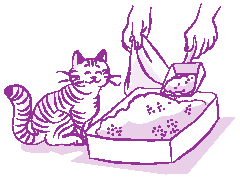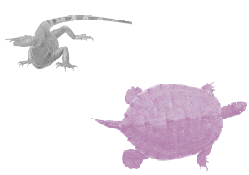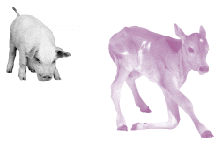En Español
- You do not have to give up your pet.
- Although the risks are low, you can get an infection from pets or other animals.
- Several simple precautions are all you need to take with pets or other animals.
- HIV can not be spread by, or to, cats, dogs, birds, or other pets.
Should I keep my pets?
Yes. Most people with human immunodeficiency virus
(HIV) can and should keep their
pets. Owning a pet can be rewarding. Pets can
help you feel psychologically and even physically better.
For many people, pets are more
than just animals — they are like members of
the family. However, you should know the
health risks of owning a pet or caring for animals.
Animals may carry infections that can be
harmful to you. Your decision to own or care
for pets should be based on knowing what you
need to do to protect yourself from these infections.
What kinds of infections could I
get from an animal?
Animals can have cryptosporidiosis ("crypto"),
toxoplasmosis ("toxo"), Mycobacterium avium
complex ("MAC"), and other diseases. These
diseases can give you problems like severe
diarrhea, brain infections, and skin lesions. You
can learn more about many of these diseases
and how to prevent them from other brochures
in this series. These are listed at the end of this
brochure.
What can I do to protect myself
from infections spread by animals?
- Always wash your hands well with soap
and water after playing with or caring
for animals. This is especially important
before eating or handling food.

- Be careful about what your pet eats and drinks. Feed your pet only pet food or cook all meat thoroughly before giving it
to your pet. Don’t give your pet raw or
undercooked meat. Don’t let your pets
drink from toilet bowls or get into garbage. Don’t let your pets hunt or eat
another animal’s stool (droppings).
- Don’t handle animals that have
diarrhea. If the pet’s diarrhea lasts for
more than 1or 2 days, have a friend or
relative who does not have HIV take your
pet to your veterinarian. Ask the veterinarian
to check the pet for infections
that may be the cause of diarrhea.
- Don’t bring home an unhealthy pet.
Don’t get a pet that is younger than 6
months old — especially if it has diarrhea.
If you are getting a pet from a pet store, animal breeder, or animal shelter
(pound), check the sanitary conditions
and license of these sources. If you are
not sure about the animal’s health, have
it checked out by your veterinarian.
- Don’t touch stray animals because you
could get scratched or bitten. Stray
animals can carry many infections.
- Don’t ever touch the stool of any animal.
- Ask someone who is not infected with
HIV and is not pregnant to change your
cat’s litter box daily. If you must clean
the box yourself, wear vinyl or household
cleaning gloves and immediately wash
your hands well with soap and water
right after changing the litter.

- Have your cat’s nails clipped so it can’t
scratch you. Discuss other ways to prevent scratching with your veterinarian. If
you do get scratched or bitten, immediately wash the wounds well with soap
and water.*
- Don’t let your pet lick your mouth or any
open cuts or wounds you may have.
- Don’t kiss your pet.
- Keep fleas off your pet.
- Avoid reptiles such as snakes, lizards,
and turtles. If you touch any reptile,
immediately wash your hands well with
soap and water.

- Wear vinyl or household cleaning
gloves when you clean aquariums or
animal cages and wash your hands
well right after you finish.
- Avoid exotic pets such as monkeys, and
ferrets, or wild animals such as raccoons, lions, bats, and skunks.
*If you are bitten, you may need to seek medical advice.
I have a job that involves working with animals.
Should I quit?
Jobs working with animals (such as jobs in pet
stores, animal clinics, farms, and slaughterhouses) carry a risk for infections. Talk with
your doctor about whether you should work
with animals. People who work with animals
should take these extra precautions:
- Follow your worksite’s rules to stay safe
and reduce any risk of infection. Use or
wear personal protective gear, such as
coveralls, boots, and gloves.
- Don’t clean chicken coops or dig in
areas where birds roost if histoplasmosis [his-to-plaz-MO-sis] is found in the
area.

- Don’t touch young farm animals,
especially if they have diarrhea.

Can someone with HIV give it
to their pets?
No. HIV can not be spread to, from, or by cats,
dogs, birds, or other pets. Many viruses cause
diseases that are like AIDS, such as feline
leukemia virus, or FeLV, in cats. These viruses
cause illness only in a certain animal and
cannot infect other animals or humans. For
example, FeLV infects only cats. It does not
infect humans or dogs.
Are there any tests a pet should
have before I bring it home?
A pet should be in overall good health. You
don’t need special tests unless the animal has
diarrhea or looks sick. If your pet looks sick,
your veterinarian can help you choose the tests
it needs.
What should I do when I visit
friends or relatives who have animals?
When you visit anyone with pets, take the same
precautions you would in your own home.
Don’t touch animals that may not be healthy.
You may want to tell your friends and family
about the need for these precautions before
you plan any visits.
Should children with HIV
handle pets?
The same precautions apply for children as for
adults. However, children may want to snuggle
more with their pets. Some pets, like cats, may
bite or scratch to get away from children.
Adults should be extra watchful and supervise
an HIV-infected child’s handwashing to prevent
infections.
For
More Information, call:
Free referrals and information:
CDC-INFO
1-800-CDC-INFO (232-4636)
TTY: 1-888-232-6348
In English, en Español
24 Hours/Day
Free materials:
CDC National Prevention
Information Network
(800) 458-5231
1-301-562-1098 (International)
P.O. Box 6003
Rockville, MD 20849-6003
Free HIV/AIDS treatment information:
AIDSinfo
(800) 448-0440
Project Inform
(800) 822-7422
Drugs undergoing clinical trials:
AIDSinfo
(800) 448-0440
Social Security benefits:
Social Security Administration
(800) 772-1213
(You also may request a personal earnings and
benefit estimate statement to help you estimate the
retirement, disability, and survivor benefits payable
on your Social Security record.)
Child Health Insurance Program
1-877 KIDS NOW (1-877-543-7669)
CDC Division of HIV/AIDS Prevention Internet
address: http://www.cdc.gov/hiv/
Additional brochures in the Opportunisitic Infections
Series:
*Use of trade names does not imply endorsement by the
United States Department of Health and Human Services.
|